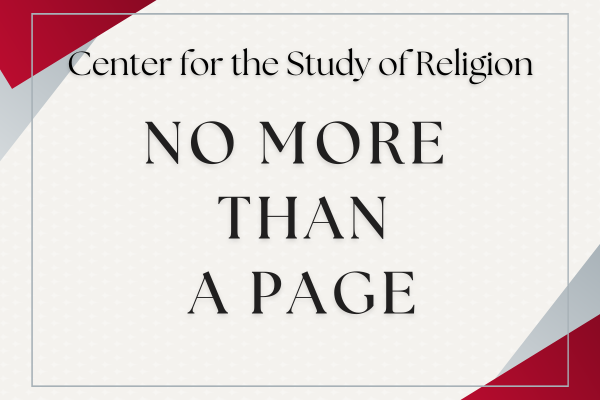
Please join us for the next installment in our "No More Than A Page" series. This series gives an opportunity for faculty and advanced graduate students to receive feedback on their research in process. Presenters provide attendees with a one-page summary of their current research and attendees engage in a lively discussion.
February's talk will be given by Ohio State University's new Assistant Professor of Classics Ben Folit-Weinberg, a scholar of ancient Greek thought whose research operates at the intersection of poetry and drama, philosophy, and intellectual history, presenting "Early Greek aēr: Matter or Agent?"
Abstract:
Though it has not received a great deal of scholarly attention, Homeric aēr has always been understood primarily in terms of matter and objects (being equivalent to mist, fog, or “our air”). In a recent article, Folit-Weinberg argues that there are good reasons for doubting whether this is the best way to approach early Greek aēr, and that what aēr should be understood instead in terms of what it does. In this case, the question of how to conceptualize aēr’s agency assumes central significance – and, given aēr’s prominent role in early Presocratic theories about the nature of reality, how one answers it has potentially far-reaching implications for the history of early Greek thought.
Dr. Folit-Weinberg's page of research is here:
Folit-Weinberg No More Than A Page: February 27, 2024
1. “Notably lacking in Homer is any sense of the immaterial and the incorporeal (gods are fleshly; souls are bits of breath; fame endures only through audible song). Homer is therefore arguably the first materialist in the West, albeit an intuitive and highly ambivalent one.” (Oxford Classical Dictionary4 s.v. “Materialism”)
2a. “…the strict meaning of aēr in Homer as ‘mist’ or tangible darkness…” (Kirk [1990] 150)
2b. “aēr in Homer and sometimes later in Ionic prose meant ‘mist’, something visible and obscuring” (Kirk, Raven & Schofield [2007] 146)
2c. “it is misleading to translate aēr ‘mist’…mist is something visible, and aēr is the very stuff of invisibility” (West [1996] ad 9; cf. Bowie [2013] ad 189, Brügger [2018] 342) 3a. Iliad 5.864–65: οἵη δ᾽ ἐκ νεφέων ἐρεβεννὴ φαίνεται ἀὴρ καύματος ἐξ ἀνέμοιο δυσαέος ὀρνυμένοιο…
3b. Odyssey 7.136–45: εὗρε δὲ Φαιήκων ἡγήτορας ἠδὲ μέδοντας σπένδοντας δεπάεσσιν ἐυσκόπῳ ἀργεϊφόντῃ, ᾧ πυμάτῳ σπένδεσκον, ὅτε μνησαίατο κοίτου. αὐτὰρ ὁ βῆ διὰ δῶμα πολύτλας δῖος Ὀδυσσεὺς πολλὴν ἠέρ᾽ ἔχων, ἥν οἱ περίχευεν Ἀθήνη, Just as when out of/after clouds a dark aēr is manifest, When after scorching heat an ill-blowing wind arises… There Odysseus discovered the leaders and counselors of the Phaeacians pouring libations from their cups to keen-sighted Argeiphontes, to whom they poured wine when they were minded to go to bed. But godly Odysseus, much-enduring, went through the hall, wrapped in the pollē aēr which Athena had shed about him, ὄφρ᾽ ἵκετ᾽ Ἀρήτην τε καὶ Ἀλκίνοον βασιλῆα. until he came to Arete and to Alcinous the king.
3c. Iliad 16.789–90: ὃ μὲν τὸν ἰόντα κατὰ κλόνον οὐκ ἐνόησεν, ἠέρι γὰρ πολλῇ κεκαλυμμένος ἀντεβόλησε…
3d. Odyssey 13.187–196 ὁ δ᾽ ἔγρετο δῖος Ὀδυσσεὺς But Patroclus did not perceive Apollo as he moved through the tumult, For having covered himself with pollē aēr, Apollo met him in battle…. But when shining Odysseus roused himself εὕδων ἐν γαίῃ πατρωΐῃ, οὐδέ μιν ἔγνω, ἤδη δὴν ἀπεών· περὶ γὰρ θεὸς ἠέρα χεῦε Παλλὰς Ἀθηναίη, κούρη Διός, ὄφρα μιν αὐτὸν ἄγνωστον τεύξειεν ἕκαστά τε μυθήσαιτ… τοὔνεκ᾽ ἄρ᾽ ἀλλοειδέα φαινέσκετο πάντα ἄνακτι, From sleep in his native land, he did not recognize it, The land he’d be absent from for years; for around (him?) the goddess had poured aēr, Pallas Athena, daughter of Zeus, so that She might make him (?) unrecognizable and tell him each thing… And so everything appeared unfamiliar (“in other form”) to their king, ἀτραπιτοί τε διηνεκέες λιμένες τε πάνορμοι the long paths and the friendly harbors, πέτραι τ᾽ ἠλίβατοι καὶ δένδρεα τηλεθόωντα. the steep cliffs and the luxuriant trees.
4. “The visual beam which leaves the eye and strikes its object plays a great part even in the later Greek theories of vision; it is clearly presupposed from the earliest times…. In this way, the aēr or haze which the gods regularly pour over persons or things to render them invisible is conceived as a shield which protects them from the gaze of men, or prevents their inner light from reaching human eyes.” (Kahn (1960) 144)
This event is free and open to the public. Co-sponsored by the Humanities Institute.
